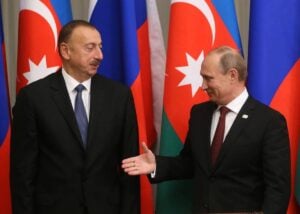
A shifting power balance in the South Caucasus is pushing Azerbaijan–Russia relations into a critical phase. In recent years, geopolitical changes in the South Caucasus have begun to reshape the once seemingly strategic relationship between Azerbaijan and Russia. Although the two countries were historically considered close allies, they are now facing a deep crisis of mutual trust — a development not accidental but rather an inevitable result of diverging political trajectories.
The trilateral declaration signed in November 2020 marked Russia’s return to the region through the deployment of peacekeeping forces in Karabakh. However, from the outset, the Russian mission has been met with skepticism in Azerbaijan. The main concern lies in Russia’s perceived lack of neutrality and its occasional implicit support for Armenian separatist elements in the region.
Azerbaijan’s counter-terror operation in September 2023, which restored its full sovereignty over Karabakh, took Moscow by surprise. During the operation, Russian peacekeepers remained passive, and Armenia’s subsequent public expressions of distrust toward Moscow further shifted regional dynamics. Russia found itself losing influence not only in Baku but also in Yerevan.
In recent months, Russian media outlets have intensified anti-Azerbaijani rhetoric, accusing Baku of promoting “Pan-Turkism,” aligning with the West, and failing to show loyalty to Moscow. Such narratives have deeply affected public perception in Azerbaijan. Among citizens and political circles alike, there is growing suspicion that Russia no longer seeks peace and stability in the region but instead aims to maintain leverage through instability.
Azerbaijan’s strengthening ties with Turkey, its push for the Zangezur Corridor, expanding cooperation with the European Union in energy, and increasingly close relations with Western actors directly contradict Russia’s strategic interests in the region. While Baku once pursued a balanced foreign policy, it is now transitioning toward a more assertive, principle-based approach. The shift indicates a growing preference for sovereignty and multi-vector partnerships, notably with Turkey, Pakistan, Israel, and Western allies.
Since mid-2024, Azerbaijan has observed what appears to be informal economic pressure from Russia. Delays at customs checkpoints, transport slowdowns, and unexplained technical barriers have been interpreted by Baku as punitive measures. In response, Azerbaijan has accelerated efforts to diversify trade routes, strengthening links within the Middle Corridor (Trans-Caspian route) and forming deeper economic ties with the Organization of Turkic States.
The information space has become another battleground. Russian state-controlled media are increasingly targeting Azerbaijan with disinformation and geopolitical accusations. In turn, Azerbaijan is responding with its own media strategy, working through public institutions, expert communities, and diaspora networks to present its position to international audiences. The informational dimension of the conflict has, in many ways, become as significant as the diplomatic and economic aspects.
Analysts suggest that Azerbaijan–Russia relations have entered a phase of “cold peace.” Diplomatic gestures and formal statements continue, but genuine strategic trust between the two capitals has eroded. For Azerbaijan, the priority is to pursue national interests without external dependency. For Russia, the goal is to preserve influence and resist Western encroachment in its perceived backyard. These competing priorities point toward either prolonged tensions or a potential confrontation in the future.
The growing rift between Baku and Moscow highlights Azerbaijan’s determination to act independently in pursuit of its national interests. Meanwhile, Russia’s increasing assertiveness and use of economic and informational tools reflect its struggle to retain its role in the South Caucasus. Whether the two countries can recalibrate their relationship based on mutual respect, or whether they slide into a deeper geopolitical rift, will significantly impact the region’s future. The outcome depends on one crucial question: Will they choose cooperation — or confrontation?
Source:
https://foreignpolicyblogs.com/2025/07/17/the-problem-with-russia/
Before It’s News® is a community of individuals who report on what’s going on around them, from all around the world.
Anyone can join.
Anyone can contribute.
Anyone can become informed about their world.
"United We Stand" Click Here To Create Your Personal Citizen Journalist Account Today, Be Sure To Invite Your Friends.
LION'S MANE PRODUCT
Try Our Lion’s Mane WHOLE MIND Nootropic Blend 60 Capsules
Mushrooms are having a moment. One fabulous fungus in particular, lion’s mane, may help improve memory, depression and anxiety symptoms. They are also an excellent source of nutrients that show promise as a therapy for dementia, and other neurodegenerative diseases. If you’re living with anxiety or depression, you may be curious about all the therapy options out there — including the natural ones.Our Lion’s Mane WHOLE MIND Nootropic Blend has been formulated to utilize the potency of Lion’s mane but also include the benefits of four other Highly Beneficial Mushrooms. Synergistically, they work together to Build your health through improving cognitive function and immunity regardless of your age. Our Nootropic not only improves your Cognitive Function and Activates your Immune System, but it benefits growth of Essential Gut Flora, further enhancing your Vitality.

Our Formula includes:
Lion’s Mane Mushrooms which Increase Brain Power through nerve growth, lessen anxiety, reduce depression, and improve concentration. Its an excellent adaptogen, promotes sleep and improves immunity.
Shiitake Mushrooms which Fight cancer cells and infectious disease, boost the immune system, promotes brain function, and serves as a source of B vitamins.
Maitake Mushrooms which regulate blood sugar levels of diabetics, reduce hypertension and boosts the immune system.
Reishi Mushrooms which Fight inflammation, liver disease, fatigue, tumor growth and cancer. They Improve skin disorders and soothes digestive problems, stomach ulcers and leaky gut syndrome.
Chaga Mushrooms which have anti-aging effects, boost immune function, improve stamina and athletic performance, even act as a natural aphrodisiac, fighting diabetes and improving liver function.
Try Our Lion’s Mane WHOLE MIND Nootropic Blend 60 Capsules Today. Be 100% Satisfied or Receive a Full Money Back Guarantee. Order Yours Today by Following This Link.









The problem with Russia is proud, arrogant, narcissistic, Zionist Trump who thinks he won the war in Ukraine.